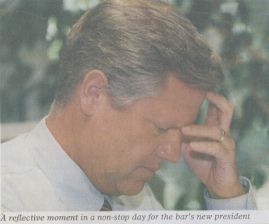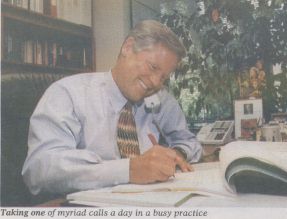 Guilford also squeezes in quick meetings with several associates about matters
they are handling, lunch at the Bowers Museum with departing summer associate Yael
Karabelnick followed by a quick look at an exhibit of Vietnamese art, a shoot with a
newspaper photographer, and a tennis date with his priest. Guilford also squeezes in quick meetings with several associates about matters
they are handling, lunch at the Bowers Museum with departing summer associate Yael
Karabelnick followed by a quick look at an exhibit of Vietnamese art, a shoot with a
newspaper photographer, and a tennis date with his priest.The day started early at a
gathering of a small group of men Guilford describes as "theological
reflectors," who meet twice a month for a book discussion. The current selection,
Dallas Willard's "The Divine Conspiracy," sits on Guilford's desk.
Deeply spiritual and active in his church, Guilford nonetheless says he's a "huge
doubter. I shock people of more assured faith. I'd say I'm at 83 percent and rising, but
I'm working on it."
Guilford will no doubt lean heavily on his faith in the coming year, as he leads the
State Bar in its recovery from the political assaults which brought it to its knees and
wrestles with old and new issues, such as multidisciplinary practices and continuing
education.
Tilting toward windmills
Nodding toward a framed Picasso print of Don Quixote, the irrational optimist who is
one of his heroes, Guilford laughs, "He reminds me if I'm going to lead the State Bar
I have to be an irrational optimist."
Guilford always asks two questions when considering a State Bar activity: Does it fall
within the bar's mission of providing legal services to the people of California? Does it
respond to its members' concerns?
To many of his thoughts about those activities, he attaches a "however" or
"with limitations." Mindful of the requirements a regulatory agency places on
its members, he is cautious about adding further burdens. At the same time, he believes
the California bar, the largest in the nation, should play a leading role in protecting a
frequently criticized legal system.
Although he is pragmatic about dealing with the legislature, the body empowered to set
bar dues, he is wary about relinquishing the bar's independence. "We need to have the
wisdom of Solomon in deciding when to weigh in and when not to weigh in," he says.
A changing society
In the coming year, Guilford wants to get the bar running again but also hopes to
explore some changes. He plans to create a group to study multidisciplinary practices
(MDPs) and wants to examine some practice issues raised by technology.
"I'd like to explore some rules and regulations and see if they're still
applicable in the new millennium," Guilford says. "A few areas are susceptible
to review in a world of new technology and rapid electronic transportation."
He also has questions about a bar exam which "flunks a lot of people and
challenges our diversity goals. What are we testing? Are we focusing on the right things?
Is it appropriate to give a three-day test? Should California be so difficult with its
reciprocity agreements?"
To all these questions, Guilford applies his guiding principle: What is best in
providing legal services to the people of California?
"Andy understands the need for an organized bar but at the same time he recognizes
the necessity to bring innovative changes," says Sheila Sonenshine, a former
appellate court justice and longtime friend. She calls Guilford a unique blend of mainline
bar politics and unwavering compassion.
Adds Los Angeles Superior Court Judge Charles McCoy, "Andy has a deep and abiding
interest in and respect for human beings. Ultimate-ly, when you see him working on plans
and programs, his real interest beneath all that is improving and bettering the lives of
people."
Father Peter Haynes, rector of St. Michael's Church, where Guilford plays shortstop on
the Holy Terrors softball team, calls Guilford "the best friend I've ever had. He has
the best priorities of any man I ever met."
Guilford's character was forged by his parents in a stern and loving environment where
simple values were stressed. Dad Howard, now 80, was a bus mechanic and driver for the
Santa Monica school district, and his mother Elsie was a housewife and part-time
bookkeeper.
Guilford, brother Jeff and sister Elaine grew up in Santa Monica, where he played
baseball, basketball and football in high school. An excellent student, he went to UCLA
and earned a Phi Beta Kappa key with a 3.97 grade point average. He even remembers, with
both chagrin and good-natured excuses, the three classes in which he received B's.
To make ends meet, he babysat, painted houses, gardened and sold tools at Sears. A set
of those tools is arranged neatly in his garage today, and his gardening talents are
evident in his yard.
The greatest achievement
 While still in college, Guilford met his wife of 25 years, Loreen, attracted,
he says, by her sweetness and bright green eyes. She also was his boss at the local
recreation center, and although she attended rival University of Southern California, the
two married while Guilford was in law school at UCLA. While still in college, Guilford met his wife of 25 years, Loreen, attracted,
he says, by her sweetness and bright green eyes. She also was his boss at the local
recreation center, and although she attended rival University of Southern California, the
two married while Guilford was in law school at UCLA.
Loreen taught school until their two daughters, Colleen, now an English major at
Columbia University, and Amanda, a high school senior, were born. His family, he says, is
his greatest achievement.
Guilford says he went to law school because he likes to argue and loves the exchange of
intellectual ideas. Although certain he wanted to work for a small firm near the beach, he
joined Sheppard, Mullin's Los Angeles office in 1975.
According to McCoy, who was part of the same class of five first-year lawyers, Guilford
played a major role in the growth of the firm from 30 to 300 lawyers. "Andy had a
vision of what the firm should be in the future, particularly in Orange County, and a
sense of the need for the firm to take on a statewide role," McCoy said. With name
partner George Richter Jr., Guilford opened the Orange County office, where he has
remained ever since as a business litigator.
He was attracted to bar work, he says, as a way to give something back to the
community, to make a difference, and to enhance the stature of Orange County's lawyers and
judges statewide. Guilford keeps pictures of both Richter and Gordon Hampton, another name
partner, on his desk as reminders of what "gentlemen practitioners should be."
True professionals, they took care of their clients, focused on being good lawyers, and
were kind to everyone, he says.
A man of integrity
Those characteristics are true of Guilford as well, says Sonenshine. "He's what I
call a lawyer's lawyer," she says. "He's a man of integrity, he's impeccably
prepared, extremely conscientious, and very sincere in protecting his clients'
interests."
 Guilford's practice of handling a wide variety of matters
reflects his desire to know a little about a lot of things, although in fact he possesses
considerable expertise about his key interests - his hero Winston Churchill; history,
particularly the Civil War; baseball, with a special fondness for both the Dodgers and the
Angels; baroque music; religion and photography. Guilford's practice of handling a wide variety of matters
reflects his desire to know a little about a lot of things, although in fact he possesses
considerable expertise about his key interests - his hero Winston Churchill; history,
particularly the Civil War; baseball, with a special fondness for both the Dodgers and the
Angels; baroque music; religion and photography.
"I don't like relaxing," he says. "I don't like quiet time. I read
non-fiction, I listen to talk shows, I go to informative places. I like basketball because
it gets my heart beating."
Oh, yes, he also writes poetry (he recently recited a multi-verse limerick he wrote
while in law school about the often mystifying law against perpetuities), and loves plays,
biographies, economics and the UCLA Bruins.
"I think Andy's never satisfied," says Sonenshine about his intellectual
curiosity. "He never feels like he's found the answer. He's continually searching to
make life better."
McCoy, who shares Guilford's fascination with Churchill, goes so far as to analogize
the two.
"Churchill was a man for his time," he says, "and frankly, I think Andy
Guilford is the right man for this time. He's the right man to begin this new century of
the bar's experience, and when it's over, he'll be remembered for it and will be greatly
respected."
 Editor's Note: The
photographs of Andy Guilford and his family were taken by Mary DeChirico. Editor's Note: The
photographs of Andy Guilford and his family were taken by Mary DeChirico.
|

